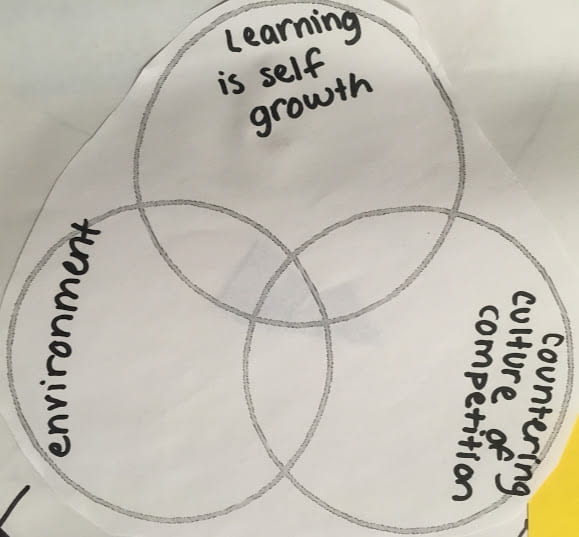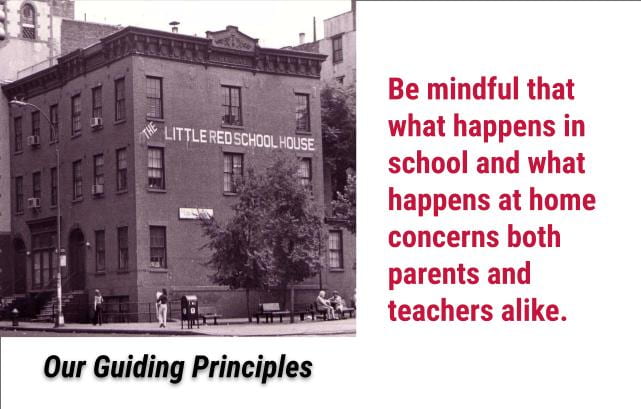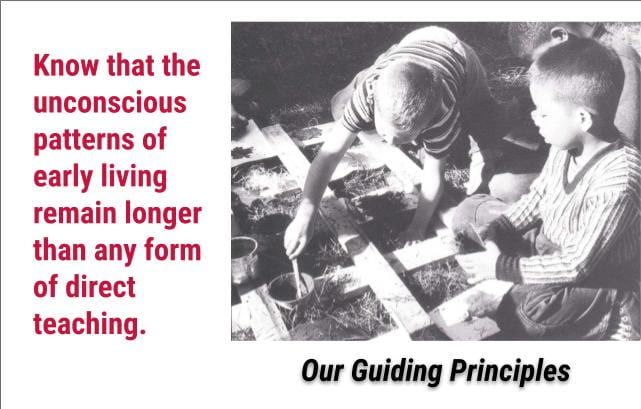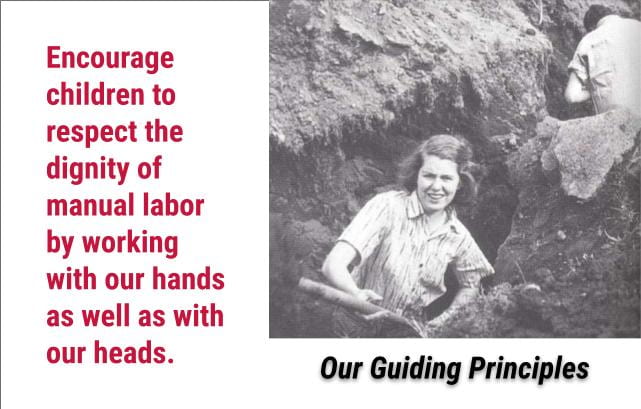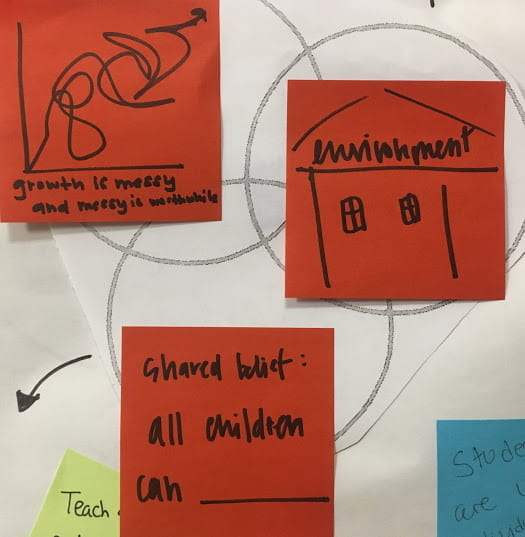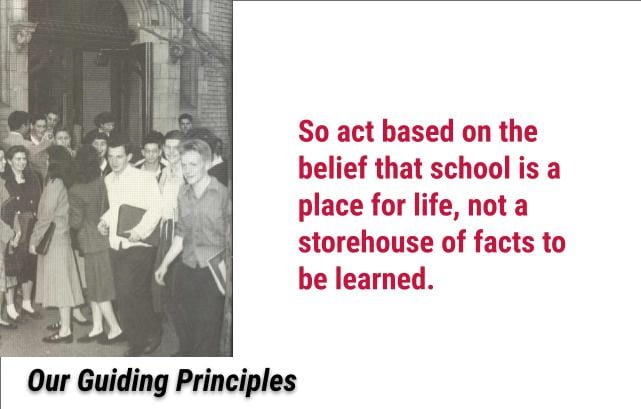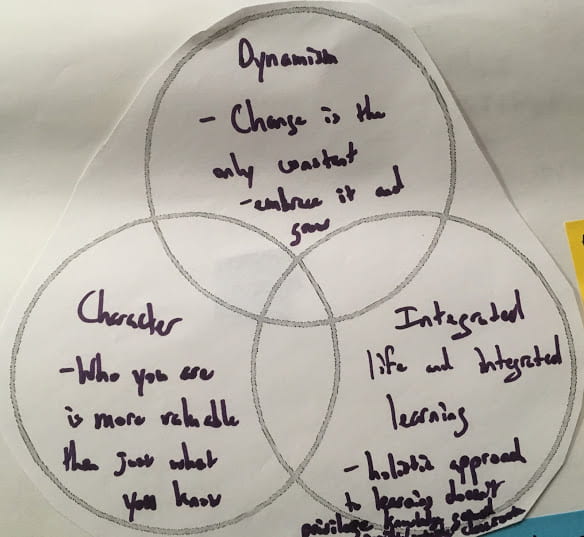As we move towards the end of the year, I thought it might be useful to return to some of the work that our new faculty and staff engaged in at the start of the year during our orientation sessions. After brainstorming personal connections to our guiding principles, participants formed groups based on the guiding principles that most resonated for them. These groups then affinity maped the collection of responses that had been generated in the brainstorming exercise. Each group mapped these ideas into one of three overarching themes that they felt amplified the core guiding principles. New faculty and staff were then asked to think about how these themes might serve as a guidepost for their wayfinding and learning work throughout their first year at LREI.
With much work already behind us, perhaps useful for all of us at LREI to ask how these guiding principles and the related themes developed by our newest community members are guiding and supporting our work with learners and pushing each of us closer to our learning edge?



Beyond Content to Critical Thinking
- Learning how to think skillfully is the best way to become a universal thinker
- Learn how to learn
- Teaching skills for knowledge acquisition, testing out ideas beyond the classroom
- Encourage curiosity and critical thinking to learn
- Learn how to be a continual learner
Counter Cultural Thinking
- Challenge to think radical/in different directions/how to hold complicated or conflicting positions
- “Thinking straight is a challenge because what it looks like so often is thinking crooked , sideways, a slant the dominant thought
- Introduce and model respect for diverse opinions and thoughts
- Expose kids to different thoughts/ideas/beliefs/both sides
Holistic Learning
- Holistic thinking
- Value roots and traditions…but do not indoctrinate. Transfer, transfer, transfer
- Encourage a child’s entire thought process
- It is important to cultivate a child’s experiences into their community
- Learning = active
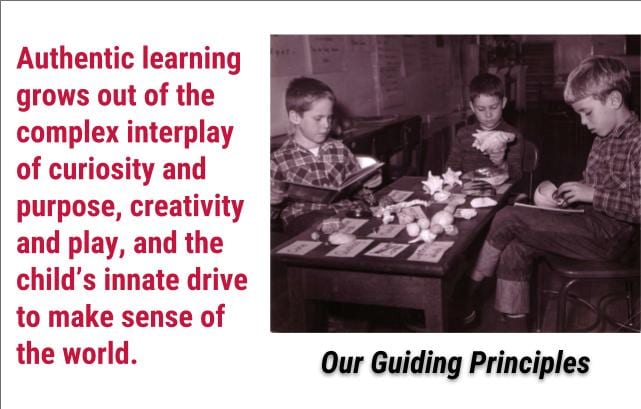



Asking Why Digging Deeper
- The questions used are better than the answer
- The courage to ask questions even in the most difficult situation
- The “village” (i.e it takes a army)
- Encourage actual thinking – open to take risk
- Create a positive open, welcoming, and active space for growth
- Curiosity is something to be honored in everyday life (creates lifelong learning)
Image of a Child as Learner, thought tracker
- Child led learning – giving validity to the natural curiosity of children, when traditionally it’s been treated as a nuisance and possibly a distraction
- Industry vs inferiority
- Students + empty receptacle of knowledge
- The qualities of future problem solving
- As a learner and educator, we should never stop asking “Why”
- Must always ask how?
- Why? When?, What? Challenge
- “Zest ferment” means teachers will not always know the answers (or even where things need to go next) – scary, but freeing
Cultivating a purposeful environment (for critical and creative thinking)
- Use provocations for learning
- This balance takes some planning and experimenting and that’s ok
- I want students to ask why
- Provide, develop skills necessary to live in this world long after graduation
- This resonates with me as a learner. I think encouraging children to be mindful of organized thinking will solve many problems of today’s world
- Building blocks of theater?
- Work with not against; innate childhood wonder, openness, awe – but also delight, distractor?!
- In my faith journey, I deeply value a safe space to ask questions.
Understanding differences is a key part of democracy
- Helping children be a part of the solution
- Learning through discussion and other’s experiences
- So important in today’s political climate. This way of thinking is the key to resistance
- Address big and small problems
- Value the experiences ups and downs of students’ lives
- Acknowledging the weight or work of true/honest recognitional acknowledgements
- And keep eyes open and on the lookout for injustice, and recognize one’s duty to take action
- Share experience in real life with students
- And look inward to challenge one’s own unearned privilege, then do something about it.
Creating a link between social-emotional and social justice education
- Social emotional education is crucial
- Social Justice education is not an addition but inherent to learning with ethics
- Help children with language to discuss human situations
Modeling openness and dialogue to encourage democratic thinking in the classroom
- Don’t shy away from hard topics
- Use social sciences/history to instill this key value – democratic process – valuing the marginalized
- Democratic skills are important to the growth of the youngest learners
- I view “eyes open” as a very task that stays with a person through all of life
- Morning meetings – allow children to have conversations about class dynamics
- Recognition as a daily habit = IMPORTANT
Tools for Thinking
- The kernel of an idea can completely change the course of learning
- Encourage students to have higher goals that are beyond themselves
- Love the world ‘supplied” LREI guides students not just lead to answers
- Providing tools for a life full of critical thinking
- Critical thinking
Experimentation
- English class as lab: experimenting will interpret actions to see which area work, hypothesizing testing hypotheses
- Experimentation requires appreciation of failure of unintentional consequences
- Experiment with life = ck, ck !!& !!
- Experimenting with life is what we’re all doing anyway, why not help children tackle the task instead of leaving them to manage it alone?
- Project inspired by students wondering at recess
- Hospitality = feeling at home; experimentation = risk, boundary-pushing creative tension!
- Process our product
- Teaching is not telling! Let them learn through experiments
- Don’t be afraid to try new approaches – even if they fail. Learn through failure too
Relational Context
- Making the school feel like a place you get to be not have to be
- Breaks down the separation between school and society
- Not dictated but relational creating context for the experiment
- Learn from each other not just the teacher
- To be able to learn from each other
- Creating community and respect for all
- Encourage kids to learn from each other and value each others’ experiences
- Love the idea of not only forming ideas, but also understanding the ideas of others
Countering Culture of Competition
- Trust
- Neutral response to thoughts, but still pushing thinking
- Enthusiasm, encouragement,creativity – not discipline or punishment
- Learning is not a competition
- Compete with yourself not against others
- Encourage ALL ideas, not just the “right” answers
- Cultivating unselfconscious industry is so important
- Informality creates space for experimentation, humor, half thought mistakes, growth
- Counter to today’s culture of self-promotion and getting ahead – focus on common good
Learning is self growth
- Decreasing competition between students will create more unity
- Teacher as student as one element of the environment – learn with students!
- Teacher isn’t dictator of standards of behavior – focus on self
- A place where all children are known, valued and loved
- A counter – cultural value system, esp in NYC
Environment
- Find the correct balance of formality and informality with students
- Creating a space for all learners to feel safe and connected
- Creating the environment for students to be inspired by other students
- The community is so evident – thoughts feel honored
- At the end of the day, it’s all about relationships
Local community
- Creating ownership of the community issues
- Life happens and allowing the community to engage in appropriate ways
- Community and global issues have a place in our classroom
- Take time to acknowledge, listen address the challenges that face the students
- To build a bridge between lower and middle school students
- Inviting speakers to come into the classroom and traveling out into the neighborhoods to learn
- Build community through grades therefore there is a confident – trust across grades
- Encouraging students to share what community means to them
- Standing up for people who are excluded or are oppressed
- To cultivate the classroom as a space that build skills to work through/counter strife/conflict
- Keeping parents involved in class conversations/developments
- As a teacher/school, we must be transparent
Whole student holistic approach
- Honor and legitimize students’ home/environmental concerns
- We only see one fragment of our students – like blindfolded people describing the elephant
- Home and school working together to ensure the best learning environment for the child
Global/political community/citizenship
- Balancing narratives, histories of resistance to oppression
- Helping build active citizens
- Develop projects that allows students to engage in community
- Young people = key to addressing many of society’s problems (racism, poverty, etc.)
- Relationships that should be cultivated
- Teaching students to be responsible citizens is crucial, all the more so today
Growth is messy and messy is worthwhile
- Setting up the space, breaking down the space and collaboration
- Lean into discomfort
- Disrupting the notion that conflict is a negative thing – just the right discomfort is where growth occurs
- Permission to “fail”
- Production discomfort
- This helps to create lifelong learners – children who love school
- When you “grow up” what do you want to be?” “happy”
- Crucial life skill that every day is a triumph
- Disagreement – what a useful task to learn about. There is never a true 100% agreement
- It’s ok to make mistakes, it’s ok to struggle, is not ok to not try – previous schools math specialist
- Learning needs to be enjoyable to those whose strength is still growing!
- Character building and stamina as a human
- Translate into contemporary political dialogue
- Teaching and learning should be enjoyable fun
Environment
- Modeling is so important! They watch everything you do
- Delegation, Delegation, Delegation (can be fun)
- Setting a safe space for healthy dialogue
- Progressive education should start early
- The classroom is just as impactful as what you learn each lesson
Shared belief all children can
- Teach to each individual, not to the collective
- Discovering what unique strengths I bring to the table
- How I learned affects how I teach – want to be conscious of this
- Teach each child individually!
- All talents should be looked at in a positive way
- Help kids to trust themselves and their abilities
- Students are unique individuals so education should not be “factery like”
- Children are capable and competent
- Help students become/discover their best selves
Dynamism – change is the only constant – embrace it and save
- This insures that growth happens
- Ought to be dynamic change constantly
- Keep traditions alive through growth and challenge
- Dare to change and be different
- Growth as a teacher to – examine yourself
Character – Who you are is more valuable than just what you know
- Educating the “whole child”
- A challenge for me as I design curriculum
- Character over content
- Intentional teaching
- Connects education with most important thing: being a good human who makes the world better
Integrated life and integrated learning
- Habits of response can relate to reading/seeing/writing – understanding socio-political-cultural context
- No barrier between “school” and “real world”: school is a permeable space!
- What can the students gain from the classroom that will help them succeed in life?
- Schools are not factories and children are not laborers
- Schools aren’t factories, children and teaching should fit student need/interest
- Focus should always be on relevancy
- School should be an extension of the outside world and visa versa
- Students should be encouraged to live life through learning in school rather than be filled with knowledge that cannot be used in real life
- Facts are important however, memorized facts without history is useless
- Engagement and curiosity come to mind



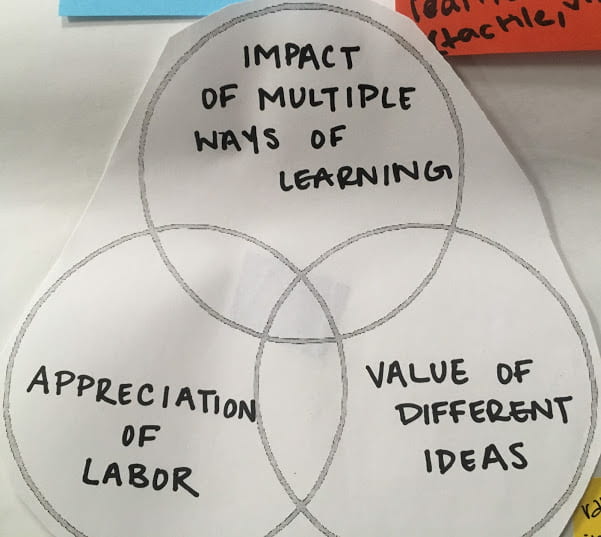
Impact of multiple ways of learning
- Multiple forms of knowledge and ways of learning
- Use clay or other art materials to make ideas concrete
- Play based learning for younger learners
- Makes learning accessible to different types of learners (tactile, visual)
- Tactile learning is very remarkable and powerful
- Student can do some hands on project or research about manual labor in real life
Appreciation of labor
- What do hands constitute in English – writing, archive, language
- How do you teach empathy? Lets understand and help children restore dignity to others US, not us vs. them
- Value of making intellectual labor concrete: making it part of the world
- Appreciate/value equally all types of skills/knowledge
- An appreciation of all labors thinking and manual
- Appreciate all labor – teaching empathy
Value of different ideas
- Value insights conclusions students come to
- Reflection and discussion are both essential to the learning process
- Key reminder that can protect against deatuned and hypocritical progressivism











